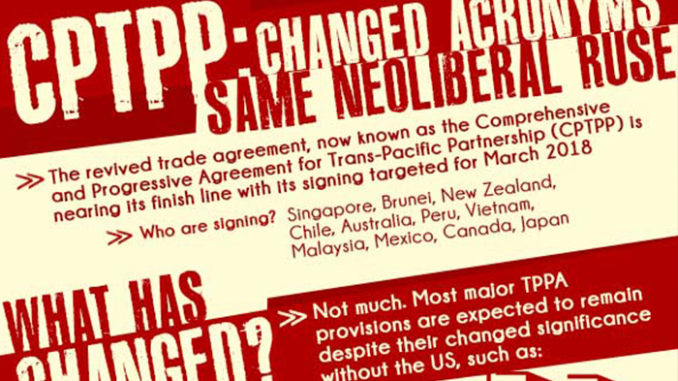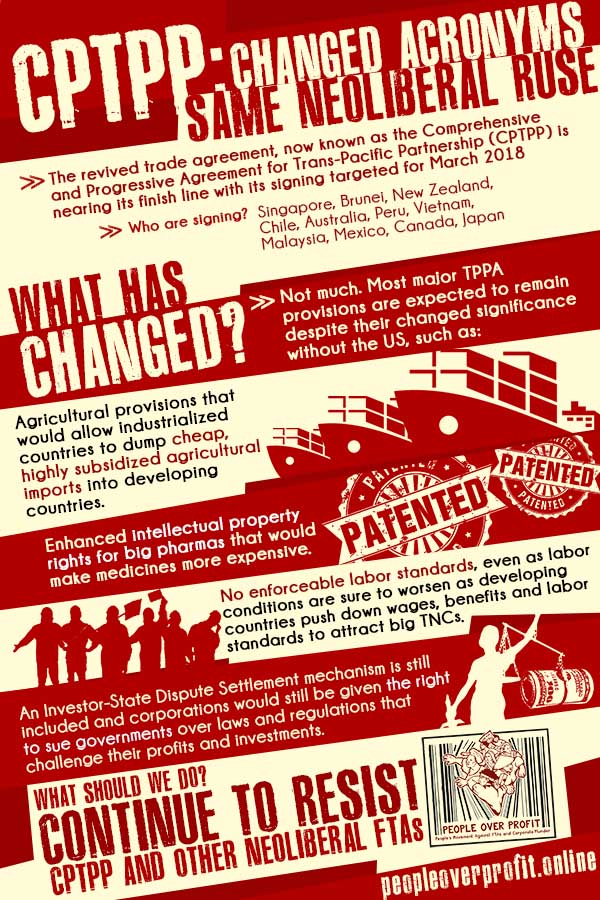
The struggle to stop the Transpacific Partnership Agreement continues amid efforts to revive the zombie free trade deal.
On Nov 11 2017, a new accord between 11 members of the Transpacific Partnership Agreement came out with a ministerial statement calling for the revival of the free trade deal following the exit of the United States. The accord – redubbed the Comprehensive and Progressive Agreement for Transpacific Partnership (CPTPP) – reaffirmed the countries’ commitment to free trade and capital flows, and to counter the impacts of years of effective campaign work of peoples’ movements and civil society that has left the credibility of corporate-led free trade deal largely eroded.
The accord will likely put pressure on negotiations for other regional FTAs such as those for the Regional Comprehensive Economic Partnership (RCEP). It will also be a welcome impetus for rich countries such as Japan, New Zealand, and Australia, who look forward to the success of the TPP to ensure their economic hegemony.
Meanwhile, the Financial Times has reported that the Department for International Trade in the UK has held informal talks about joining the CPTPP.
There are still many details for the member countries to work out. But the pact does not fundamentally differ from when the US was part of the negotiations through the end of Barack Obama’s presidency.
About 20 provisions that were once part of the TPP talks have been “suspended,” according to a joint statement by the agreement’s member countries. There are four sticking points – such as express delivery, biologics, investment, telecommunications, and medical devices – to solve, but experts say a final deal could be achieved by early 2018. Each country would still have to sign and ratify the deal to be a member of the agreement.
Threats to peoples’ rights remain
Most major TPPA provisions are expected to remain despite their changed significance without the US.
Notably, no agricultural commitment appears on the list of suspended provisions. For developing country farmers whose governments are engaged in the negotiations, the threat of dumping of cheap, highly-subsidized agricultural imports of rich industrialized countries remains. This kind of trade distortion puts farmers at risk of losing their fair share of the market and result in the total destruction of their local agricultural production systems.
The CPTPP retains enhanced intellectual property rights for Big Pharmas, making medicines, such as those for HIV/AIDS, expensive. Contrary to the claim that strengthened IPRs are needed to enhance research and development, Medecins Sans Frontiere revealed that research for new medicines has not increased in recent decades despite greatly enhanced IPRs.
The CPTPP does not include enforceable labor standards. Governments that will sign on to the agreement will only commit to implementing their own labor laws and not to recognized international standards, and they are not enforceable in the same way as other chapters in the agreement.
In fact, the CPTPP will further worsen labor conditions for workers of member countries. Malaysian automobile workers will face the threat of unemployment as the Malaysian automobile industry face stiffer competition against Japanese car manufacturers, as the Malaysian International Trade and Industry Minister Datuk Seri Mustapa Mohamed admitted. Competition for employment as evidenced by experience of workers in developing countries results in lowering of wages, benefits, and labor standards.
Ged Kearney, president of the Australian Council of Trade Unions, also condemned the fact that the CPTTP still includes investor-state Dispute Settlement (ISDS). ISDS gives foreign corporations the right to bypass national courts and sue governments for millions of dollars over domestic laws, which could include labor, health and environmental laws.
Peoples’ resistance continues
Voices critical against the CPTPP continue. Professor Jomo Kwame Sundaram, former UN Assistant Secretary-General and co-author of a critical study measuring the employment costs of the original TPP, debunked some of the main myths about the newly named Comprehensive Progressive Agreement for Trans-Pacific Partnership (CPTTP). The deal, he explained, is about the promotion of corporate-friendly rules for foreign investors, rather than trade gains. Strengthening intellectual property monopolies for transnational corporations would ‘undoubtedly’ increase prices, not generate more goods and services.
Meanwhile peoples’ organizations and civil society are gearing up actions to resist TPP and its various incarnations.
The Australian Fair Trade and Investment Network (AFTINET) is currently engaged in a signature campaign to urge Australian trade minister Steve Ciobo to not persist with the talks to revive the TPP.
People Over Profit (POP), a global network of social movements against free trade and corporate greed, continue to conduct information dissemination campaigns to help peoples’ movements effectively challenge CPTPP, RCEP, and similar free trade deals.


Leave a Reply